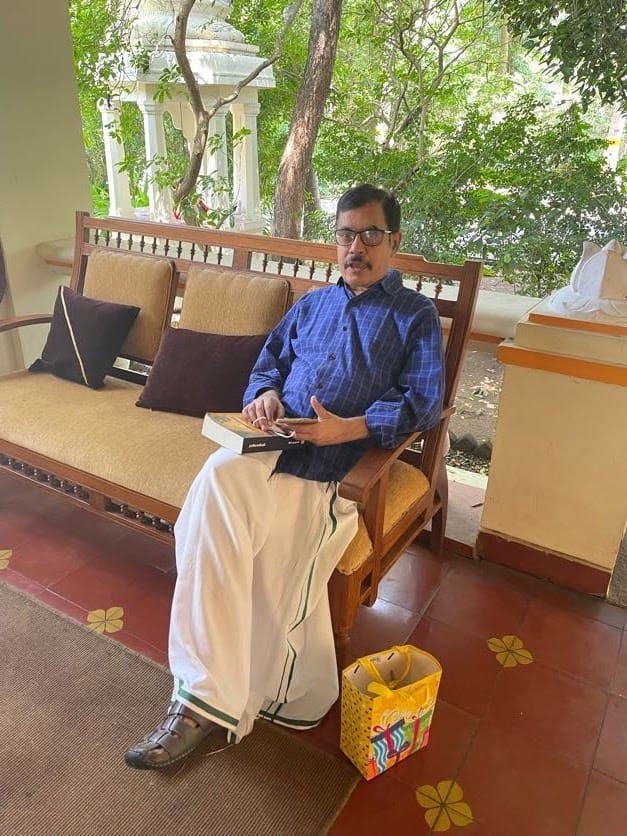An iron monster of a machine on four wheels, trumpeting like an elephant, the king thought the car and his neighbour’s gramophone must be one in spirit. It was the Banian Brothers who had first told the king the name of the music box—gramophone. The music box too came after the king’s time. The Banian Brothers said they had procured it for the tobacco merchant.
‘It does not take up an eighth of the space of the Austin,’ they told the king, adding that they could get him both a gramophone and an Austin.
Where was the money for these things? the king thought sadly. If one had the money, one could travel back in time and do whatever was needed to make one’s life pleasurable. The king had once turned to his ancestors for suggestions to enhance his finances. It was a death anniversary and a priest had been invited to recite mantras for the spirits of the ancestors. The ancestors, however, had other ideas. They told the priest, ‘Brahmin, take your alms and leave. We wish to speak with our great grandson.’
The priest paid no heed. He made balls of boiled rice and handed them to the king, bidding him to sprinkle water and sesame seeds on them and offer them to the ancestors.
‘Sesame seeds don’t agree with us,’ said one of the ancestors. ‘Why don’t you offer us chicken? We would appreciate that.’
‘This is the right offering to make to enable you to reach salvation,’ the priest snapped. ‘If you don’t believe me, I can bring the books to prove it.’
The ancestors asked the king to give the priest alms of four pumpkins, onions, cabbages, potatoes, turnips (which the Banian Brothers brought from the future) and four gold coins, and send him away.
The priest said the only way he could help the ancestors attain salvation was by offering them rice balls sprinkled with sesame seeds. Receiving no reply from either the king or the ancestors, he left in a huff with his vegetables.
When he had gone, the ancestors gathered around the king urging him to be thrifty. ‘You don’t need a new fangled vehicle or music box. ‘Nor do you need to travel to the Malayalam coast to ogle bare-breasted women. Do you know how angry those women are at being humiliated? Their feelings will scorch you, reduce you to ashes.’
The ancestors also warned the king about the Banian Brothers. ‘Don’t trust them. They come from the future.’
The king had a ready answer to this: ‘You come from my past. Do I not trust you? Why should I not trust those from the future?’
The retort offended the ancestors. ‘Such impudence is a sure sign of Kali Yuga,’ they said, and vanished.
The king was sorry he had let them go before asking for a new chariot, but they were hardly likely to provide him one when they were against the very idea of his travelling to the Malayalam coast. He thought of the Banian Brothers again.
He summoned the Brothers. All he had to do was think of them, and they appeared before him immediately. The Brothers had taught him this trick. They had told him about a communication device from their time that made use of wires to carry voices over long distances. The wires had to be strung between iron posts erected across the countryside. The king told the Brothers that the new-fangled system seemed too complicated. The real reason for his reluctance to install the system was that he could not afford it. Even if he found the money to erect posts and string wires between them, his poverty-stricken citizens would most uproot the posts and sell them for rice.
When the king mentally commanded the Banian Brothers’ presence this time, they were unable to come at once. They were collecting funds for the local temple’s flower festival. The king had started the festival in his time—he had arranged for cartloads of flowers to be brought from the countryside and had the priests shower them on the idol of the goddess. The king and queen had stood outside the sanctum sanctorum watching as the white jasmine, yellow chrysanthemum and fragrant screw-pine were offered to the deity. His citizens stood outside, on the bare red earth of the temple grounds, fidgeting and waiting for the real celebrations to begin. These were heralded by the arrival of more bullock carts (after the worship of the goddess was over) bearing huge earthen pots of toddy. The king bought liquor for the entire village, and ensured that there was enough for every villager to get four glassfuls of toddy.


